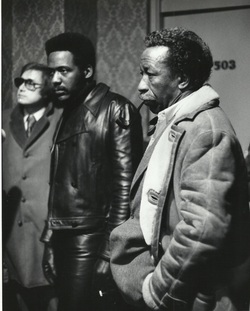
SHAFT, 1971 Tom, Roundtree, Parks
Tom wasn’t certain why he got the call to work on Shaft. Perhaps his success and delicacy in dealing with the matter of naked black extras on Alex in Wonderland had something to do with it. Actress/dancer Paula Kelly had worked as choreographer on that film, with special contribution to the nude sequence, and Tom, knowing her theatrical and movie work, had become friendly with her. He speculated that word about him might have reached Shaft director Gordon Parks from her.
It didn’t seem like all that promising a project. A black action film with a modest budget, being made in New York during a cold winter. A black director, better known as a photographer than a director, although his earlier film The Learning Tree had pleased some. An unknown star, Richard Roundtree. The biggest name in the cast was Moses Gunn, but how many movie tickets would that sell? Yet it became of the most successful movies Tom ever worked on, when you compare profits with costs.

Somewhere along the way, once
production had started, an attempt was made to remove Tom from the movie and
replace him with a black publicist. It is unclear (at least to Tom and me)
whether this impulse came from African-Americans working on the movie or from
corporate headquarters who might have thought that change would give them
points in the black community. In an act of consideration and faith that Tom
never forgot, Gordon Parks pulled him aside to discuss the matter. Parks asked,
“Tom, do you want to continue working on this picture?” Tom said that indeed he
did. “In that case,” Parks said, “I want to keep you on the movie. I like what
you are doing.” That put an end to the
matter.
Roundtree became concerned that not much mention of him was reaching the press during the weeks of production. Tom explained to him that as a publicist, his feeling was that publicity during production was a waste of time, especially with an actor not yet known to the press. It was much wiser to prepare publicity materials during production to be used at the time of release of the movie. If the movie and the performance became noticed, the material would be put to good use then. But all the publicity in the world during production would be for naught, and just might possibly harm the actor in the future, if it bombed. Roundtree wasn’t sure, but he decided to trust Tom. And it did work out just as Tom had predicted. (Tom had a similar discussion with Lonette McKee years later during the making of The Cotton Club.)
I have never known Tom to be uncomfortable around black people (or any other ethnic group, for that matter). To him they were just people, but he also had the ability to understand and sympathize with any special concerns they might have because of their heritage and history. Most white publicists of the time seemed to be afraid to go into black communities, like Harlem. Tom had no fear. Tom did believe that his success working on Shaft led him to be regarded as one of the few New York-based publicists to go to when you were looking for a good interface between black actors and staff and the predominately white media of the time.
Roundtree became concerned that not much mention of him was reaching the press during the weeks of production. Tom explained to him that as a publicist, his feeling was that publicity during production was a waste of time, especially with an actor not yet known to the press. It was much wiser to prepare publicity materials during production to be used at the time of release of the movie. If the movie and the performance became noticed, the material would be put to good use then. But all the publicity in the world during production would be for naught, and just might possibly harm the actor in the future, if it bombed. Roundtree wasn’t sure, but he decided to trust Tom. And it did work out just as Tom had predicted. (Tom had a similar discussion with Lonette McKee years later during the making of The Cotton Club.)
I have never known Tom to be uncomfortable around black people (or any other ethnic group, for that matter). To him they were just people, but he also had the ability to understand and sympathize with any special concerns they might have because of their heritage and history. Most white publicists of the time seemed to be afraid to go into black communities, like Harlem. Tom had no fear. Tom did believe that his success working on Shaft led him to be regarded as one of the few New York-based publicists to go to when you were looking for a good interface between black actors and staff and the predominately white media of the time.